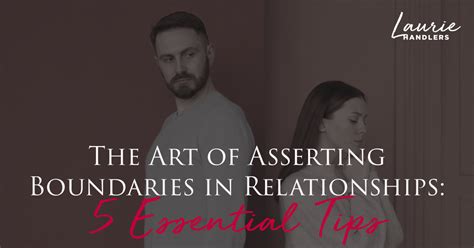In the realm of interpersonal relationships, navigating boundaries can be a complex and challenging task. Boundaries are invisible lines that define the limits of what is acceptable and unacceptable behavior, and they play a crucial role in maintaining healthy and respectful interactions.

The Importance of Boundaries
Setting clear boundaries is essential for several reasons. First and foremost, it communicates what you will and will not tolerate, thereby reducing the likelihood of feeling resentful, taken advantage of, or disrespected. By establishing boundaries, you are essentially sending a message that your time, energy, and emotional well-being are valuable and should be respected.
Furthermore, boundaries foster mutual respect and understanding. When everyone involved in a relationship knows where the lines are, it becomes less likely that misunderstandings or misinterpretations will occur. This can lead to more open and honest communication, as well as a greater sense of trust and security.
Types of Boundaries
There are various types of boundaries that can be established, including:
- Physical boundaries: These boundaries define the physical space you occupy and what is considered acceptable physical contact.
- Emotional boundaries: These boundaries protect your emotional well-being and define what you are and are not comfortable sharing with others.
- Time boundaries: These boundaries regulate how much time you are willing to allocate to specific relationships, activities, or commitments.
- Material boundaries: These boundaries protect your possessions and set limits on what others can borrow or access.
- Intellectual boundaries: These boundaries safeguard your thoughts, opinions, and beliefs from being challenged or dismissed.
Setting Effective Boundaries
Setting effective boundaries involves a multi-faceted approach that includes the following steps:
- Identify your needs: Start by understanding what is important to you and what you find unacceptable.
- Communicate your boundaries: Clearly and directly express your boundaries to others, using “I” statements. For example, instead of saying “Don’t call me after 10pm,” say “I prefer not to receive calls after 10pm.”
- Enforce your boundaries: Consistency is key. Once you have set a boundary, it is important to stick to it, even when it is uncomfortable.
- Be prepared for resistance: Some people may resist your boundaries, either because they are unaware of them or because they do not agree with them. Be patient and reiterate your boundaries as needed.
- Seek support: If you have difficulty setting or enforcing boundaries, consider seeking support from a therapist or counselor.
Benefits of Setting Boundaries
Setting boundaries offers numerous benefits, including:
- Increased self-respect: Setting boundaries helps you develop a greater sense of self-worth and respect for your own needs.
- Improved relationships: Boundaries foster healthier relationships by reducing conflicts and promoting respect and understanding.
- Reduced stress: By limiting the amount of stress associated with feeling overwhelmed or taken advantage of, boundaries can contribute to overall well-being.
- Increased productivity: Establishing clear boundaries allows you to allocate your time and energy more effectively, leading to increased productivity.
- Improved decision-making: Boundaries enable you to make wiser decisions by helping you prioritize your values and goals.
Putting People in Their Places: Case Studies
The following case studies illustrate the importance and effectiveness of setting boundaries:
- The overbearing parent: A young adult sets boundaries with their parent, limiting the frequency and length of their visits to ensure they have more time to focus on their own life and responsibilities.
- The demanding colleague: An employee sets boundaries with a colleague who is constantly asking for favors or interrupting their work, explaining that they are happy to help occasionally, but they also need to prioritize their own tasks.
- The intrusive friend: A person establishes boundaries with a friend who often overshares personal information or gossips about others, expressing that they value privacy and are not comfortable discussing certain topics.
Boundary Violations and Consequences
Boundary violations occur when someone crosses the lines you have established. This can be intentional or unintentional, but it is important to address boundary violations promptly and respectfully.
Consequences for boundary violations may include:
- Verbal acknowledgment: Politely reminding the person that they have crossed a boundary.
- Requesting an apology: Depending on the severity of the violation, you may ask the person to apologize for their behavior.
- Limiting contact: If repeated violations occur, you may need to limit contact with the person until they demonstrate respect for your boundaries.
FAQs on Putting People in Their Places
- Q: Is it necessary to set boundaries with everyone?
- A: No, it is not necessary to set boundaries with everyone. However, it is important to establish boundaries with people who have a significant impact on your life or who may challenge your well-being.
- Q: How do I set boundaries with someone who is close to me?
- A: Setting boundaries with close relationships can be more challenging, but it is still possible. Be clear and direct, but also be patient and understanding. Remember that boundaries are not about punishment, but about protecting your own well-being.
- Q: What if someone does not respect my boundaries?
- A: If someone repeatedly crosses your boundaries, it is important to address the situation directly. Let them know that their behavior is unacceptable and that you will need to limit contact if they continue to violate your boundaries.
- Q: Can boundaries change over time?
- A: Yes, boundaries can change over time as your needs and circumstances change. It is important to periodically review your boundaries to ensure that they still align with your values and priorities.
Conclusion
Setting boundaries is an essential skill for maintaining healthy and respectful relationships. By clearly communicating your boundaries, you are taking an active role in protecting your well-being and fostering mutual understanding. Remember that boundaries are not about controlling others, but rather about creating a space where you feel safe, respected, and valued.
